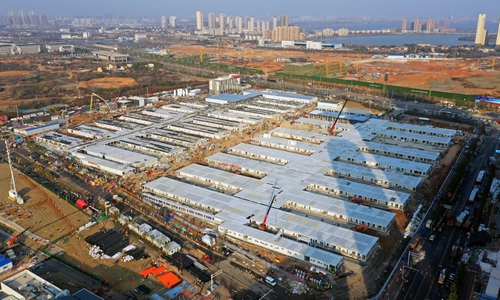HOME >> CHINA,SPECIAL-COVERAGE
WHO says new hospitals in China's Wuhan remarkable effort, pays tribute to lab staff
Source:Xinhua Published: 2020/2/6 17:16:43

The construction site of the Leishenshan (Thunder God Mountain) Hospital in Wuhan, central China's Hubei Province, Feb. 5, 2020. Leishenshan Hospital, one of the makeshift hospitals to battle against the novel strain of coronavirus in Wuhan, has completed its main part of construction. (Xinhua/Li He)
The World Health Organization (WHO) said Wednesday that the construction of new hospitals in China's city of Wuhan for novel coronavirus patients is a remarkable effort, while paying tribute to lab technicians who have been under huge workload of diagnosis and testing.
The Huoshenshan (Fire God Mountain) Hospital, a makeshift hospital with 1,000 beds dedicated to treating patients infected with the coronavirus, was completed in Wuhan, the epicenter of the epidemic, in a record 10 days. A second one, with 1,600 beds, is now under construction.
The construction in such a short time represents a remarkable effort, not only in terms of public health, but also in logistics, planning and architecture, and certainly the ability to bring moderate and severe patients to a site where they can be treated properly, which would also protect their communities from possible infection, Dr. Michael Ryan, executive director of WHO Health Emergencies Program, said at a press conference.
"This is a major undertaking." Ryan said.
Health and medical personnel from other parts of China will come to the newly-built medical facilities in Wuhan, which shows the remarkable solidarity within China and the determination of the Chinese health authorities, he said.
"They are continuing to do everything humanely possible to put the health of their own population above any other consideration, and in doing that offer an opportunity for the rest of the world to prepare (for the virus)," he said.
Ryan also expressed his respect for the lab technicians and other frontline workers who have been under a huge workload.
"Remember, when you see 4,000 or 3,000 confirmed cases, that means thousands of negative cases as well; getting a negative result is just as much as getting a positive result ... so the workload on those labs is extreme," he said.
In Hubei Province and particularly in Wuhan, despite adequate reagents and materials to carry out diagnostic tests, there is still a backlog in testing because of the gap between the availability of laboratory technicians and the workload, he said.
"One can expect that in situations like this, one always sees a backlog," he said, adding that the WHO is working with the Chinese authorities to scale up the lab service.
Ryan said a WHO-coordinated team of global experts, covering clinical management, virology, vaccine, drug development, ecological investigation, animal health, epidemiology, public health and risk communication, will soon visit China.
"The team's objective is to learn from Chinese counterparts' experience in dealing with this event so that the world can learn from them," he added.
Posted in: SOCIETY,MORE